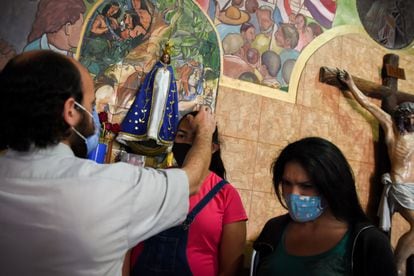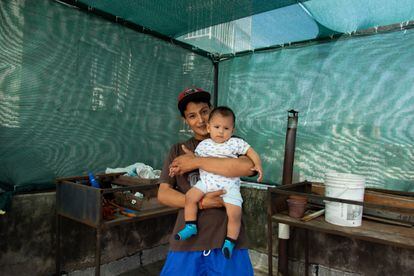In Argentina, marginalized trans people turn to the Catholic Church for help
The Vatican sponsors several shelters with the blessing of Pope Francis, providing financial and spiritual support despite the Holy See’s inconsistent position on LGBTI rights
/cloudfront-eu-central-1.images.arcpublishing.com/prisa/YNQWSYFT2FBIXCRB2LZWMWDHXA.jpg)
The Virgin of Caacupé accompanies the figure of Christ in the chapel that bears her name in Buenos Aires’ Villa 21-24 slum, on the banks of a filthy waterway. Legend has it that the original figure was sculpted by an indigenous Guarani, who sought her protection from enemies in another village. Paraguayans and Jesuit priests were the first to worship her, but today she is also one of the most venerated patron saints of Argentina. Centuries later, she is still enveloped in blue and white with a golden crown carved from wood, but her painted eyes gaze down on a very different reality. Priest Facundo Ribero raises his hand and places it on Angie’s forehead. Her friend Raizza waits her turn, and both trans women receive communion.
When the sun goes down, the light turns yellow inside the church. Barking dogs and cumbia music can be heard beyond the walls, along with the rising smell of meat grilling. Out front, military police stand guard, clutching rifles. Villa 21-24 is a “heavy” neighborhood, as the Argentines say, where the atmosphere is as thick as the unbreathable air.
”More than accepting them, I would say we receive them,” says Facundo, who is known to all by his first name. “We accept something that is given to us, as if there were no other choice. On the other hand, to receive is to take a position. It seems that, little by little, once again ideas that are linked to the purest gospel are being given attention. In the sacred scripture, Jesus appears with friends that nobody else wanted. Prostitutes, tax collectors – the gangsters of the time – lepers; in general, people who were marginalized by society.”
Facundo belongs to a movement of slum priests that emerged in Argentina at the end of the 1960s. They live in the poorest neighborhoods and are committed to the most needy. During the pandemic they have found themselves on the front line, fighting fiercely against the fallout from the virus. Desperate trans people arrive at the doors of this church seeking absolution, and pleading for help.

In Francesco, a documentary that premiered in October 2020 in Rome, Pope Francis encouraged the approval of civil unions for homosexual couples, in a break with his predecessors. The pontiff’s words were captured in a section of the film that reflects on pastoral care for those who identify as LGBTI (lesbian, gay, bisexual, transgender and intersex). “Gay people have a right to be in a family, they are children of God, they have the right to a family. You can’t throw anyone out of a family or make life [for them] impossible because of that,” the pope said. “A cohabitation law is needed. They have the right to be legally recognized,” he added. Subsequently, the Vatican released a statement saying that his words in the documentary were taken out of context and edited. It clarified that Catholic Church doctrine is unchanged.
Five years ago, Pope Francis was asked directly about trans people. “Life is life, and things should be taken as they come,” the pope said. “Sin is sin, but trends or hormonal imbalances ... can cause many problems and we have to be careful.” However, he then added: “But each case must be welcomed, accompanied, studied, discerned and integrated. That is what Jesus would do today.” That might sound confusing for many worshippers, but Father Facundo doesn’t think so: “It doesn’t sound strange. We met him here when he was a cardinal. He clarified things for us with his keen remarks. It brings a lot of clarity in terms of mapping out a new horizon,” he says. After praying, Angie and Raizza say goodbye to the priest, and he bids them goodbye with the words “go in peace.” The women disappear into a labyrinth of narrow, winding streets. They are not afraid of the night, their former ally, but of the “wolves” that lurk in the darkness.

The next day, the sun shines brightly. We are in Flores, where Pope Francis grew up and found his calling. It is also home to Animí, a shelter linked to Hogar de Cristo (Home of Christ), a Catholic charity. Here, trans women arrive fleeing lives on the street, often marked by abuse and addiction. Angie opens the door, smiling. The house has eight rooms, communal spaces and weekly activities in theater, gardening, therapy, and advice on legal and work matters. They also make handbags and belts for a well-known Argentine brand. Angie has lived here the longest of all the residents, and seems at ease. Her room is perfectly tidy, and when she timidly opens one of the closets, a rosary hangs from a picture of her mother. The portrait reads: “Alda Esmelda, the best of all the mothers who brought me to this.”
The road has been far from smooth. “Almost a year ago I had a stroke, I was hospitalized for a year, but now I feel happy to be in a beautiful home,” Angie says. “I left the street behind, all ugly things that happened there. I took paco [crack] with a gang that brought me over from Peru. I haven’t touched that crap for almost 10 years.” Her family were observant Catholics. “That comes from my mother, may she rest in peace. They were very Catholic, went to Mass and everything. I was baptized. In my country I felt uncomfortable, as society is much more closed-minded, but here in Argentina people are much more liberal.” Regardless, she adds: “I have always believed in God.”
On the outdoor terrace, several people tend to a vegetable garden. Karen, 34, sweeps up some leaves, and some thyme that has fallen loose. The smell is soothing. She goes downstairs to start cooking a flan. She looks like an expert, but it’s the first time she’s cooked the dish. “I come from Iquitos, from the Peruvian jungle. I arrived here when I was 22 years old and started taking merca [cocaine] and drinking alcohol, but over time it stopped having any effect, until I tried crack. One morning I had a stroke, I was hospitalized for seven months in intensive care and I didn’t know where I was. I didn’t know what year or month it was... nothing. Later, when I recovered, I had nowhere to stay,” she says. Karen was transferred to her current home from the Hogar de Cristo shelter. She describes a positive relationship with the Church. “I believe very strongly in God because I was reborn thanks to Him, though I was already going to Mass before that. My parents are evangelical. In the Peruvian church there is a lot of discrimination, but even during my relapses I always believed. When I came to Animí they helped me when I could barely move. They helped me with antiretrovirals, with food on weekends, with a room,” she adds.
This is the raw gospel from the grassroots, Jesus welcoming the marginalized, their cries, providing answers, and integrating them into societyGabriela, head of Casa Animí
Standing next to her is Sebastian, a trans man who holds his nine-month-old son Bastián in his arms. Bastián looks up at him with bright, marble-like eyes. Sebastian recounts the long road he has traveled to reunite with his son, who was born as the result of rape. ”I’m from Tucumán, in the north of the country. I came here to sell drugs and I was kind of running away. I was locked up when I was a minor for a murder that I wasn’t guilty of. When I got out it was hard for me to return to normality, so that’s why I came to Buenos Aires. Here I started to sell drugs, and to take them as well. I define myself as a trans man, and as a dad. It was very hard to get my son back. Before it was very difficult for me to talk about this but today I can. Imagine the discrimination there was against me, in addition to my past. I was able to get custody of the baby. They gave him back to me when the foster family got Covid-19. There is still more discrimination against transsexuals of one gender than another,” he explains. At age 17, Sebastian told his father that he liked girls, and his father told him to follow his heart. “I also have another 10-year-old daughter, Ailen, also born from rape. My family takes care of her, but soon I hope to take care of her myself.”
In the living room, Gabriela, who runs Casa Animí, lays out photos of the trans women who have passed through the shelter but didn’t make it. She reads out their names: Sheyla, Kiara… her list goes on. Tuberculosis and even meningitis can kill when your defenses are low. Gabriela lights candles, and continues. “This is the raw gospel from the grassroots, Jesus welcoming the marginalized, their cries, providing answers, and integrating them into society.” She lingers on the stories of salvation like Razzia, Lorena or Paola, who was found half-dead in a hospital. “She left the shelter one day and fell back into her old life. Now, after taking antiretrovirals and us caring for her, she has regained 30 kilos. The doctors can’t believe it, it’s a miracle,” she says.
Another of the better known “angels” is Monica Astorga, a cloistered nun belonging to the Discalced Carmelites order. For more than a decade she dedicated herself to helping trans women recover from drug and alcohol abuse. She also helps them out of prostitution and into other employment. She is credited with helping at least 100 women who sought out her help, and even created a neighborhood for them. Astorga received this message from Pope Francis: “In Jesus’ time, lepers were rejected like this. They are the lepers of today. Don’t leave behind the frontline work.” The first step to establishing trans weddings in Argentina took place in 2014 in Santiago del Estero, where priest Sergio Lamberti blessed the union of José Leonardo Coria and Luisa Lucía Paz, leader of the Association of Transvestites, Transsexuals and Transgender of Argentina (ATTTA), who had been living together for 29 years. The ceremony – albeit symbolic – was held in accordance with Catholic ritual.
The Church has four other shelters in Argentina specialized in welcoming and caring for trans people who arrive escaping extreme situations. Public institutions also sponsor other centers. Back in Villa 21-24, the bells ring out on another Sunday Mass. Angie waits her turn once again to receive communion. Glances and barely disguised laughter come from the crowd. But no one comes between her and receiving the body and blood of Christ. She takes the wafer bathed in wine, closes her eyes and feels at peace, or at least a certain calm. She leaves the line to the altar and says: “This is enough for me, it’s just something that takes time. They will understand one day.”
This feature was made possible thanks to collaboration by Lucas Schaerer.
/cloudfront-eu-central-1.images.arcpublishing.com/prisa/XOQH5PJ3KNDTHOYZLZPEFT6PFY.aspx)
/cloudfront-eu-central-1.images.arcpublishing.com/prisa/ON3ZNQGNZ5H7VF654M3FGDH5CU.jpg)










































